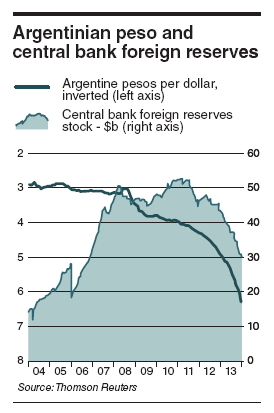Peso plunge puts emerging markets back into spotlight
By Korea HeraldPublished : Jan. 26, 2014 - 20:02

The peso stabilized Friday after plunging 14 percent in panic-selling over two days that recalled memories of the country’s 2001 financial crisis
After the peso’s worst single-day fall in more than a decade, the government abandoned an unpopular ban on buying dollars, allowing citizens to once again hedge against its plunging value by hoarding their savings in foreign currency.
With the Turkish lira, Russian ruble and South African rand also hitting new multi-year lows last week, worries about emerging markets succumbing to turmoil have returned with a vengeance.
The economies of emerging markets were thrown into disarray last May when the U.S. Federal Reserve warned it may turn off the taps of easy money that had shifted foreign investment to the developing world in search for better returns.
Their currencies slumped and the pressure has mounted as the Fed has begun to cut stimulus money, and their growth prospects have dimmed.
But economist Christian Schulz at Berenberg bank said “so far, the sell-off is not indiscriminate and therefore not systemic.”
He noted that emerging markets are more mature now, “so a catastrophic chain reaction as in 1997 is less likely” when crisis reverberated across east Asia and sparked concern of a global economic meltdown.
Neil Shearing, chief emerging markets economist at Capital Markets, noted that “market turbulence in Turkey, Ukraine and now Argentina has led to talk of a new crisis sweeping emerging markets.”
But for him “the real lesson from recent events is that the need for investors to discriminate between individual emerging markets has never been greater.”
While the Fed’s “tapering” of its stimulus reverberated across the globe, it has revealed different weaknesses in different emerging market economies.
Shearing puts Turkey and South Africa into a category of countries that have lived beyond their means and now face a period of weaker economic growth.
These are most vulnerable to the Fed‘s taper and the return to tighter monetary conditions as they must pay more to attract the investment needed to keep their economies growing.
But their difficulties are also complicated by other factors, such as the political crisis sparked by a corruption scandal embroiling members of Turkish Prime Minister Recep Tayyip Erdogan’s inner circle damaging investor sentiment.
The Turkish lira has lost about 10 percent since mid-December, when the crisis erupted.
In South Africa, a wave of strikes in the key mining sector has damaged sentiment.
The rand has slumped to its weakest level in five years, breaking through the symbolic 11 rand to the dollar level, and is down by 25 percent since last May.
Shearing says the largest group of countries is those facing domestic structural problems that are holding back growth, and this includes the biggest emerging markets often known BRIC nations ― Brazil, Russia, India and China.
Markets were spooked last week when a survey showed the Chinese manufacturing sector contracted for the first time in six months in January.
There have also been recent concerns about a credit crunch as the new Chinese leadership seeks to clamp down on rampant lending that has led a build up of huge debts by local government authorities.
In Russia there are concerns that stagflation could emerge, a one-two economic punch of stagnating growth and high inflation.
With an annual growth rate of just 1.2 percent in the third quarter of 2013, Russia‘s $2.0-trillion economy is set to achieve its worst economic performance since 2009.
Economists attribute the country’s pains to a variety of factors that boil down to an urgent need to switch to a new economic model reliant on innovation and investment instead of oil and natural gas exports.
Brazil‘s growth has also slowed down sharply from the 7.5 percent recorded in 2010, slumping to 1.0 percent in 2012.
The IMF has urged the country to act more decisively on bolstering investment and increasing competitiveness if it is to revive growth.
The Indian rupee also took a battering last year, but India’s Finance Minister Palaniappan Chidambaram sought to reassure business leaders at the Swiss resort of Davos for the annual World Economic Forum that the country is better prepared to handle repercussions from the shift in U.S. monetary policy.
-
Articles by Korea Herald








![[Graphic News] More Koreans say they plan long-distance trips this year](http://res.heraldm.com/phpwas/restmb_idxmake.php?idx=644&simg=/content/image/2024/04/17/20240417050828_0.gif&u=)
![[KH Explains] Hyundai's full hybrid edge to pay off amid slow transition to pure EVs](http://res.heraldm.com/phpwas/restmb_idxmake.php?idx=644&simg=/content/image/2024/04/18/20240418050645_0.jpg&u=20240419100350)






![[From the Scene] Monks, Buddhists hail return of remains of Buddhas](http://res.heraldm.com/phpwas/restmb_idxmake.php?idx=652&simg=/content/image/2024/04/19/20240419050617_0.jpg&u=20240419175937)

![[KH Explains] Hyundai's full hybrid edge to pay off amid slow transition to pure EVs](http://res.heraldm.com/phpwas/restmb_idxmake.php?idx=652&simg=/content/image/2024/04/18/20240418050645_0.jpg&u=20240419100350)

![[Today’s K-pop] Illit drops debut single remix](http://res.heraldm.com/phpwas/restmb_idxmake.php?idx=642&simg=/content/image/2024/04/19/20240419050612_0.jpg&u=)